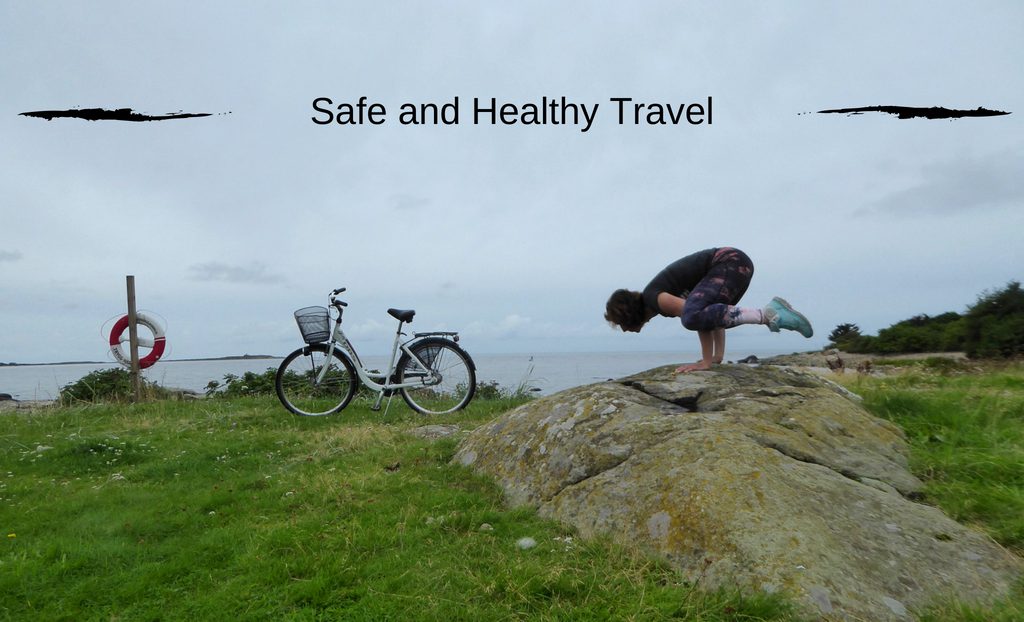How to prevent altitude sickness?
I hadn’t given it a second thought when I went to Kyrgyzstan. I was looking for some adventure and that was what I was going to do. I had given myself a challenge, I didn’t want to travel as much anymore without a certain goal. I wanted to have a theme or anything in my travels. This time the theme was horseridiing in the mountains of Tien Shan near the Issyk Kul Lake. I didn’t even thought about the fact that I would be for 5 days staying over 3000 metres above sealevel…
In the end I had a headache for 4 days out of 6 I was on the horse
I had taken some painkillers, paracetamol 500mg, but in no time they were gone. When the guide also got a headache it went very quick. During the night my headache was the hardest. We were sleeping in a tent and on a thin mat on the floor. Every time I wanted to change my side I woke up. I was out of breath… I was stuck in my sleepingback… needed to fix that.. had to catch my breath again… My head started to hurt again…
And slowly I fell asleep again…
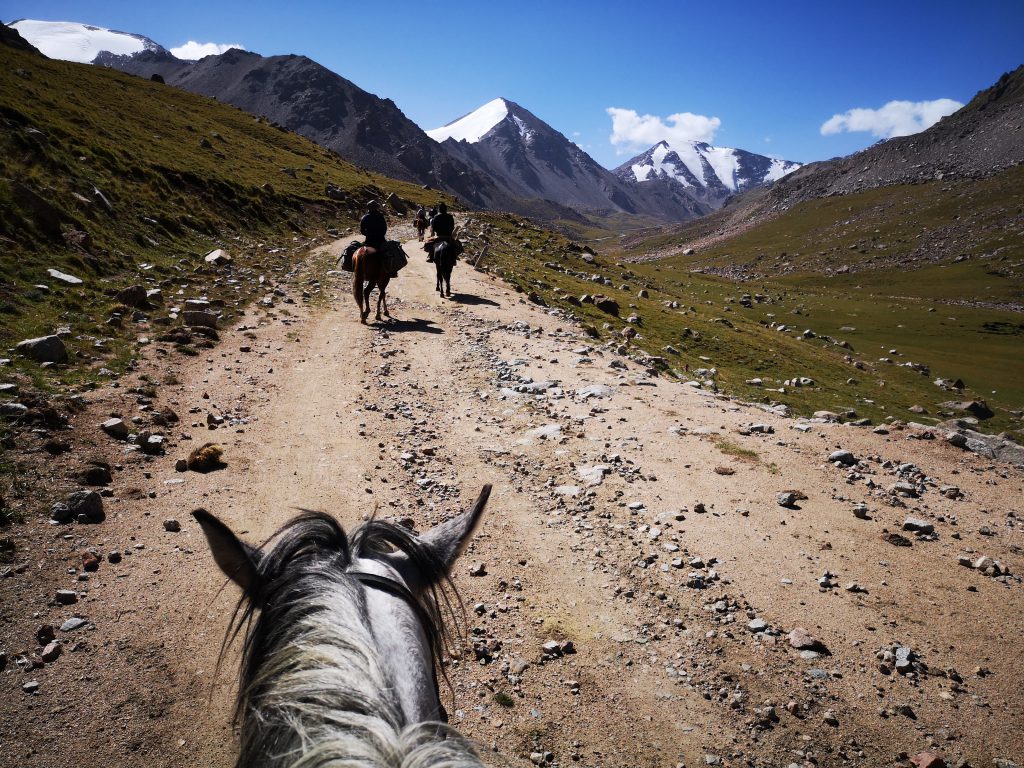
What bordered me too..
Each night my lower lip got really swollen. In the morning it got better again and it was slightly feeling sensitive. Was that the sun burning during the day? Was it the altitude? I don’t know.
When I later on was in the capital, Bishkek, my lip had bursted and it was covered by blister… So painfull!!
During those hard and tough nights I thought to myself.. Why do I want to be here?
And then each day, riding the horse I enjoyed everything so much and felt so happy to be there and to experience this!!
I would do it all over again in a hearbeat.
But… then I would prepare myself a bit better. What can happen when you go to a higher altitude. On my list on things to do is Nepal for next year and I want to go into the Himalayas. So I need to prepare myself and read into that! I need to know what to do to minimize the burden so I can enjoy the experience of being there even more!!
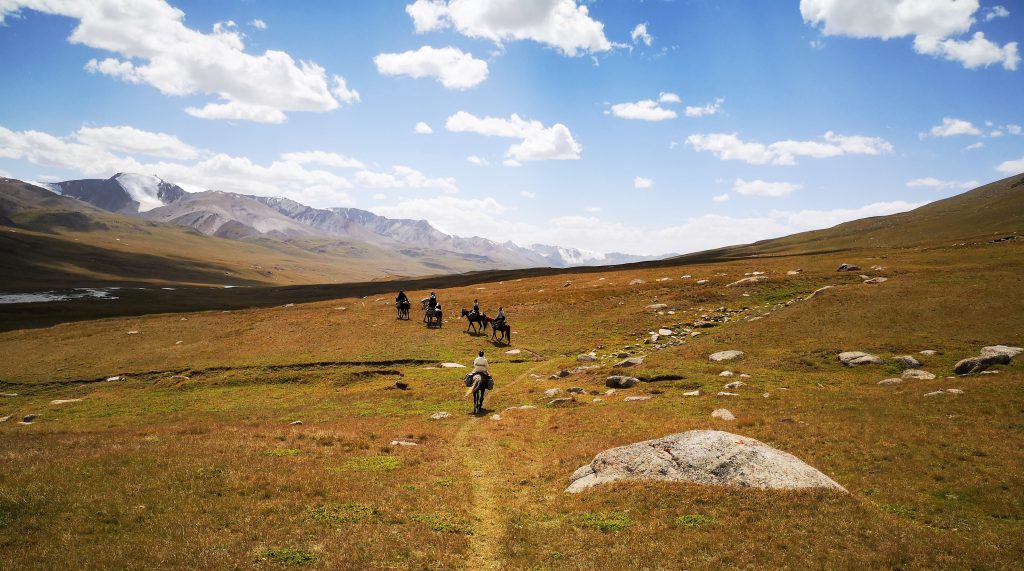
Be honoust!!
You would love to see this view in person too right?
To be better prepared next time I started to look into the altitude sickness .. What do you need to do? Or what shouldn’t you do? What medication is good and is it for anybody to go travel in higher regions?
- What causes altitude sickness?
On an altitude of around 2000 to 2500 metres it can start. You don’t get enough oxygen and your body needs to fight to survive, it needs to adept to its new surroudings. Your body needs time to adept and if it doesn’t get enough time you can get a headache, get nauseous or even feel some tightness on your chest.
Did you know?
10-25 % has some signs of altitude sickness starting at 3000 metre? This percentage goes quickly to 50% at an altitude of 4500 metres.
- Chance of getting altitude sickness – 4 factors
- Going up to fast
- Sleeping at an high altitude
- Some people are just more sensitive to it
- being active
The first morning of my Kyrgyzstan trip I skipped breakfast. I didn’t feel good, my head hurted and even more… I felt nauseous. I had the feeling that if I didn’t concentrate and started to move easy I could go and vomit. It was a strange feeling, I can’t fully define it. But what I did know was that I needed my attention fully to myself.
We wouldn’t go any higher that next night so I hoped it would stop soon. I feel happy to be able to tell you that I didn’t felt nauseous again after this time. The headache I did kept for the upcoming 5 days of the trip. We spend it between 2800 metres and 4000 metres.
- Headache
If the altitude sickness means only having headache that goes away with some painkillers it is oke. Drink lots of water and don’t be too active. Best thing ofcourse is not to go higher.
- Heavy headache
If you can’t fight the headache with a painkiller and it is more then you used to make sure to get more oxygen in your body. This is easy to get when you go to a lower altitude but you can also get that by inhaling extra oxygen. There are specially designed oxygen tanks or bags for that. If you have used this it is good to consider a day rest at the same altitude for your body to adept.
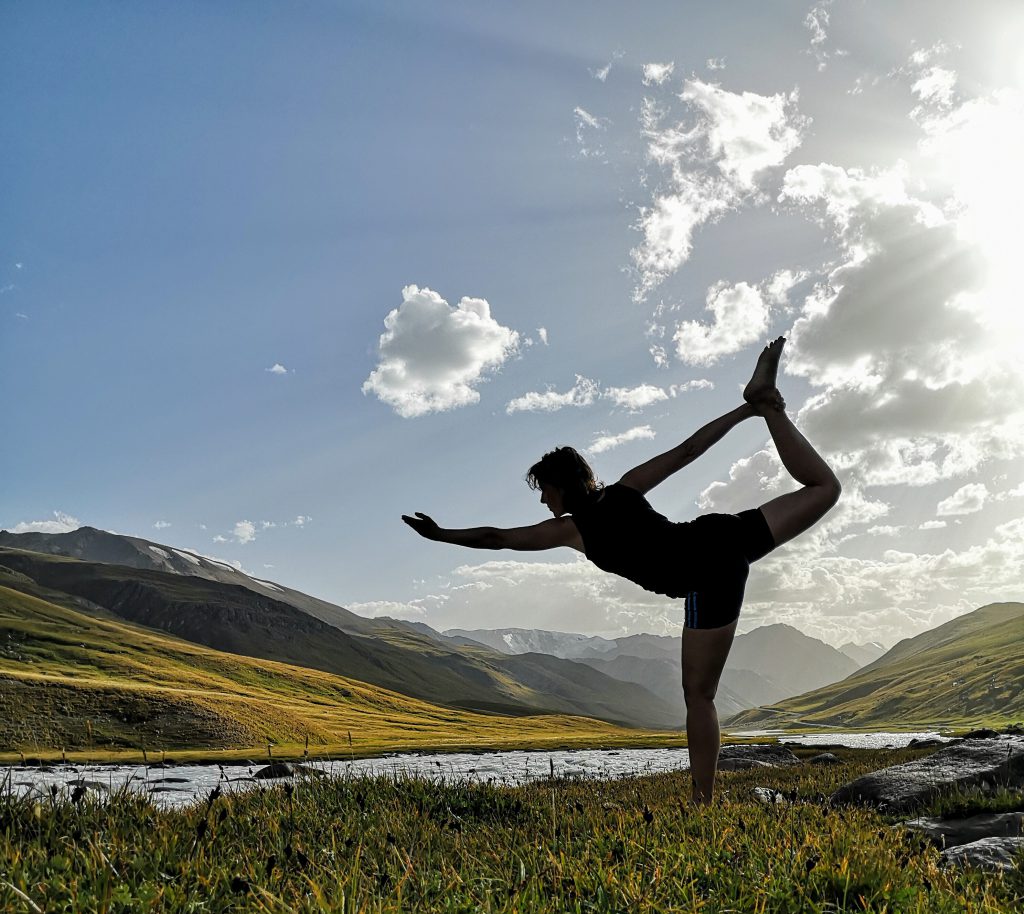
What if things get worse?
You do get sick… you start seeing strange things??
Altitude cerebral edema and pulmonary edema is rare below 3000 metres. Everybody can get this desease but we Dutch, living on or even below sealevel, are more sensitive and more liable to it.
- Altitude Cerebral Edema
When your headache get so bad that it will not go away with some painkillers you need to start to think about descending. Fluid will come out of your blood vessels and this will stay in your brain… and there is hardly any place for that. Because of that the phenoma you’ll get because of that are severe.
The signs are that loose sense of reality, getting a feeling of being under the influence of alcohol, loose your coordination, problems with your bladder, drowsiness. If you feel this or see it at someone else you really need to take action. Things get worse after that and even can get into an epileptic seizure or symptoms of paralysis and in the worst case get into a coma. You need to go down as soon as possible and get medical help.
- Altitude Pulmonary Edema
Just as in the brain, explained above, in this case it is fluid in the lungs. Because of this there is an inadeguate amount of oxygen able to provide your blood circulation. After some time it can be that you are drowning in fluid that has build up in your lungs. If you feel that you have problems that can lead to this please take action because I read it can happen at night really quickly if things build up.
The signs are: anxiety, increased pulsation (also in rest), pain on your chest, headache that won’t stop by using painkillers, dry cough, blood in vomit / saliva, feeling nauseous, not sleeping, dizziness, etc.
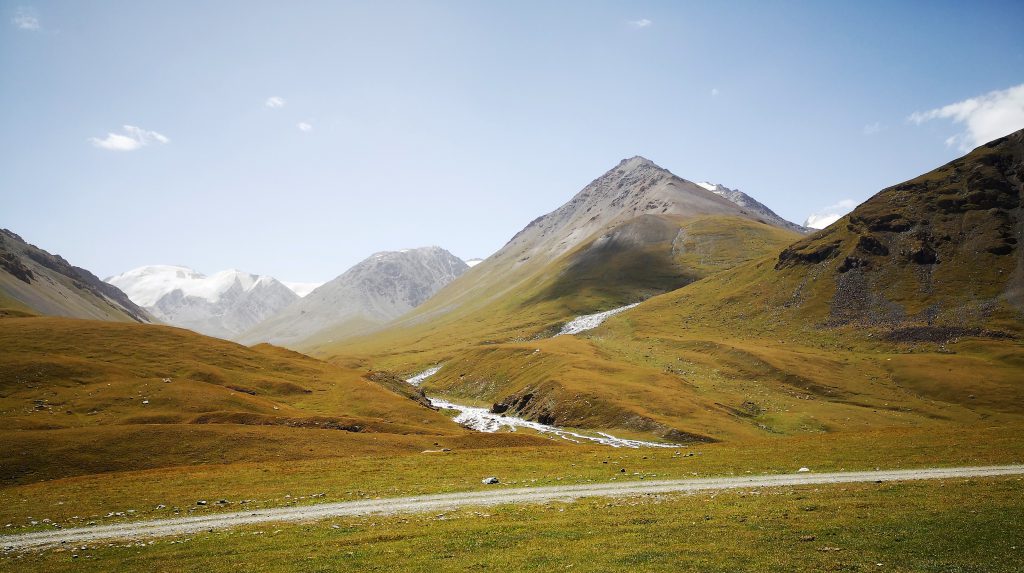
What does altitude with your body – Altitude Sickness
Use Oxygen?
Using oxygen seems like the way to solve this problem. Your body needs more of it and you make sure it gets it. Well.. appearently it doesn’t work that way. You’ll delay the process that makes your body get oxygen yourself. If you keep taking extra oxygen you don’t force your body to work for it itself and to adept to the altitude. So don’t do this without taking any other actions like for instance going down again for a couple of 100 metres or at least stay at the same altitude.
- How to prefend altitude sickness?
If you decide to into the mountains to enjoy the beautiful view you need to go slowly. You need to give your body the time to adept to its new surroundings.
If you come from sealevel it is a good plan to be on an altitude of 2500 – 3500 for a resting day. Let your body adept, don’t go explore too much on that day and really let your body get used to the altitude.
The recommendation is to not ascent more then 300 to 600 metres per day. Especially when you are above 4000 metres it is important not to go to fast. Research has shown that hardly anybody can get away with that unpunished. So take it more easy and enjoy your climb more. You’ll get more time to enjoy the surroundings when you are healthy and can get your attention fully to the outside world!!
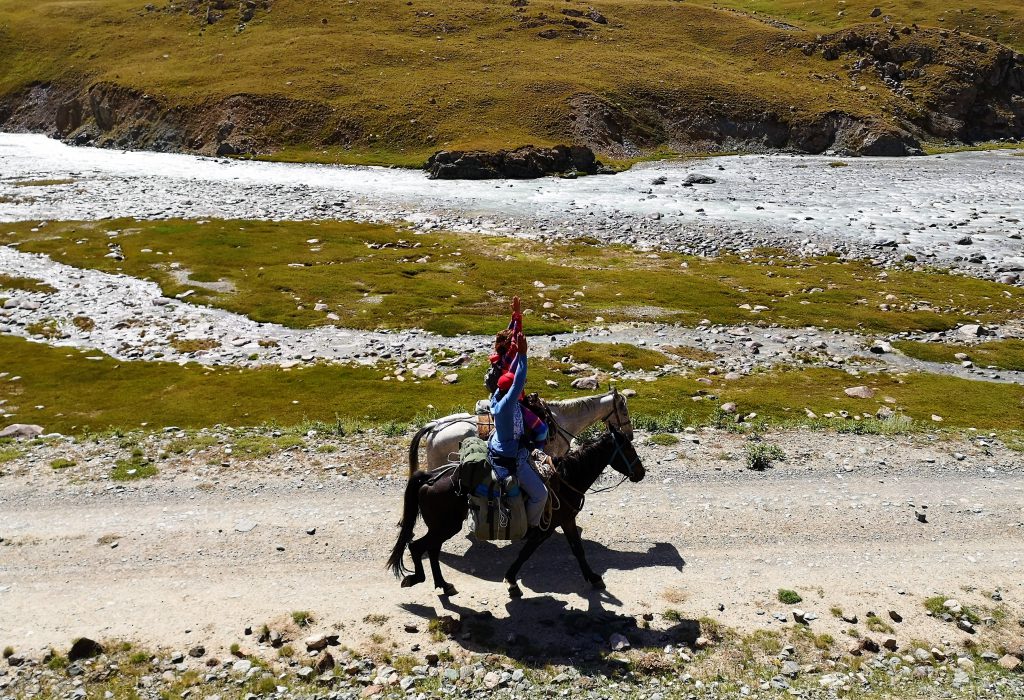
Yoga is always a good idea, right?
What is important to take care off on forehand?
- Be in good physical shape
When you are in a physical good shape you will recover quick. The only thing is that you might think you can handle more. Don’t go that extra mile and stick to the program. Try not to ascent to much on one day and also for you a resting day is a good plan 🙂
- Carbohydrates
Huh?Well… I don’t talk a lot about food as it comes to carbohydrates and those kind of things. I think that goes in one sentence with a diet and loosing weight… But it seems that if you burn carbohydrates it takes less oxygen of your body. So it can keep that to itself which can be essential being on a higher altitude. You ofcourse need to eat good and drink enough, ofcourse no alcohol. Your body is working hard and needs it!
Carbohydrate rich drinks are not the solution. They will slow down the digestion and can cause nauseousness.
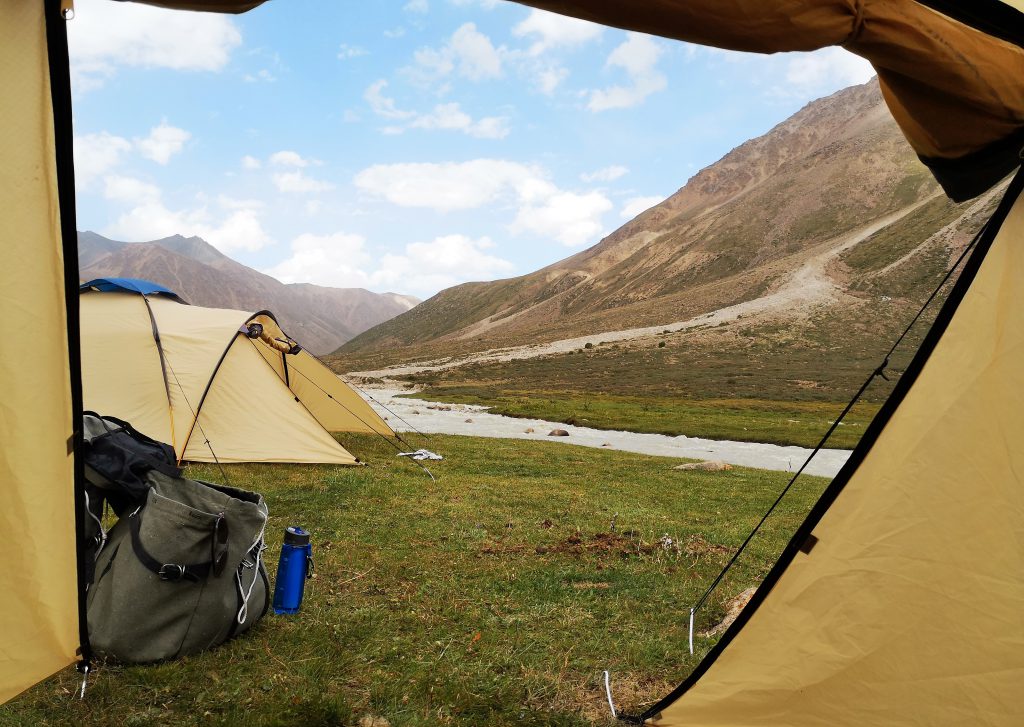
Who is extra sensitive for altitude sickness?
- Women
Why is my first question?? Women are more likely to have anemia. And especially women that still have their period. So go to the doctor if you think you might be having anemia. It is easy to fight this with iron supplements.
- Hereditary factors
Not much is known in this area. They do know that people that had long edema are twice more sensitive to get altitude sickness at a next atempt to go climb an higher altitide.
- Pregnant and climbing?
If I read all this I wouldn’t take the chance. It seems that the oxygen grade in the blood of the mother gets priority and so the oxygen in the blood of the child might get less. Climbing and being active at an altitude higher then 2500 metres isn’t discouraged but as long as you don’t know for sure that it’s not hazardous for the child I wouldn’t do it. They need to do a lot more study to indicate if it is a real problem for the child. Research indicates that children born on altitude are smaller.
The higher the mother lives the smaller the birth weight of the child.
Did you know that there is a tent in which you can acclimatize? You can go in such tent on forehand and let your body get used to an altitude. The chance of getting sick will decrease.
A tent like that is very expensive though…with a cost of around 5000 dollar. There are also company that rents them ofcourse.
What does being at an altitude to your body
Altitude sickness
There are different medicines to prevent altitude sickness or when the effects has started to limit that effect. I will not write about all these medicines…we’ve got doctors for that matter. I did found a website that I found usefull when writing this blog and for more information and please check that page for more information about altitude sickness.
Did I forget something?
Have you experienced altitude sickness?
I would like to hear about it!!
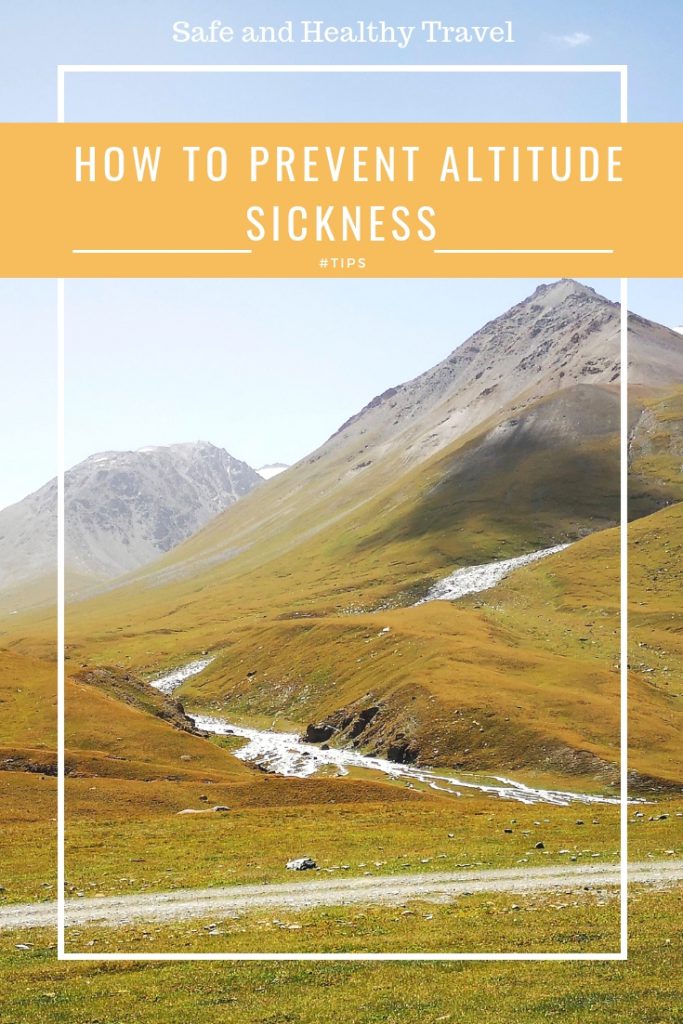
Would love it if you shared this post!!
Want to read more?
5 Tips To Drive Safe in a Foreign Country
What to do when you get robbed?
More Safety because of Trekkingpoles
Rules about Smoking Weed in The Netherlands
Or can I inspire you to go camping?
I hope you love this world as much as I do!!
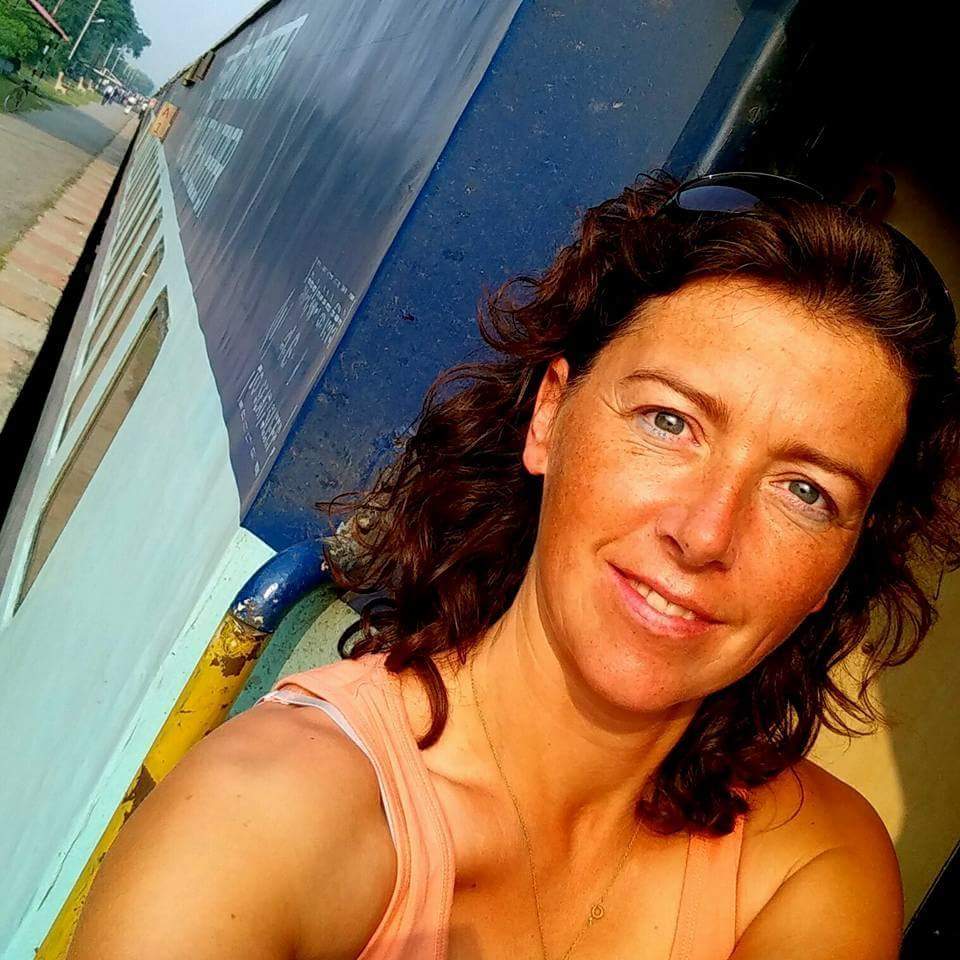
Jacomijn is een politieagent uit Nederland die jou graag laat zien hoe je veilig, actief en gezond de wereld kan over reizen. Safe and Healthy travel is a MUST






